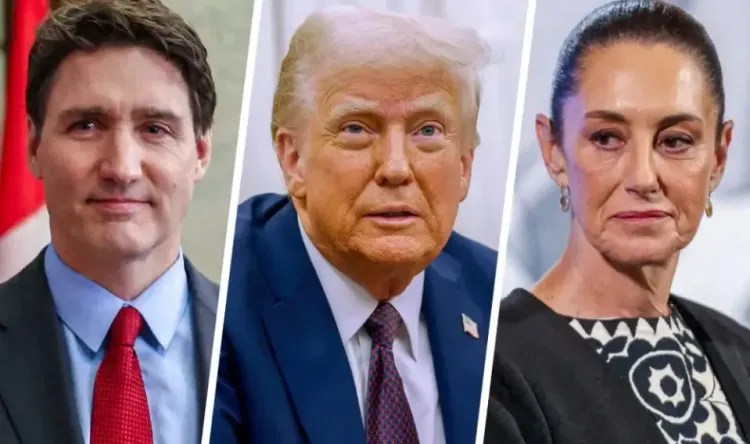Trump Postpones Tariffs on Canada and Mexico for One Month

Synopsis
Key Takeaways
- Trump postpones tariffs on goods from Mexico and Canada for almost a month.
- The decision follows discussions with Mexican President Claudia Sheinbaum.
- USMCA aims to create a free trade zone among the three countries.
- Tariff exemptions may apply to USMCA compliant goods.
- Trade tensions with Canada continue as Trudeau criticizes Trump's policies.
Washington, March 7 (NationPress) - U.S. President Donald Trump has enacted executive measures that will postpone tariffs on all goods imported from Mexico and Canada subject to the USMCA trade agreement for nearly a month. This decision represents a notable reversal of the administration's key economic strategy, causing unease among markets, businesses, and consumers.
The executive measures came after a conversation between Trump and Mexican President Claudia Sheinbaum, along with discussions between Canadian officials and the Trump administration.
“Following my conversation with President Claudia Sheinbaum of Mexico, I have consented that Mexico will not be subjected to tariffs on any products that fall under the USMCA Agreement,” Trump posted on Truth Social after a phone call with the Mexican leader.
He announced that the tariffs would be deferred until April 2.
The USMCA, which is the United States-Mexico-Canada Agreement, was negotiated by Trump during his initial term, establishing a free trade zone among the three North American nations.
“I made this decision as a gesture of goodwill and respect for President Sheinbaum. Our relationship has been very positive, and we are collaborating closely on border issues, including preventing illegal immigration and halting fentanyl trafficking,” Trump continued.
Sheinbaum expressed gratitude to Trump for the respectful dialogue regarding the tariffs he imposed.
Sheinbaum remarked that “almost all” of Mexico's trade with the United States falls under the USMCA.
“Practically all the trade we engage in with the United States is included in the Mexico, United States, Canada Agreement. There are some aspects concerning rules of origin, but nearly everything is encompassed by the trade agreement,” she stated at a press conference on Thursday.
However, a White House official clarified that approximately 50% of imports from Mexico and 36% from Canada are indeed covered by the agreement, but many additional items, such as avocados, are typically excluded due to compliance costs. Those items that technically do not meet USMCA standards have been effectively treated at customs as compliant, hence avoiding tariffs.
This trade policy is quite complex, and the White House representative suggested that producers of those goods might register to comply with USMCA regulations to escape the 25% tariff for a month.
The official directed the press to the US Trade Representative for further specifics on which products will continue to incur the 25% tariff and which will not once more information becomes available.
Included among the USMCA-compliant goods are automobiles, which Trump announced on Wednesday would receive a one-month reprieve from tariffs. The administration stated that this delay would allow automakers to shift more production to the United States to avoid the tariffs set to take effect next month. However, this is unlikely to occur since it would require substantial hiring, investment, and strategic planning.
As for energy sourced from Canada, it is not included in the USMCA, according to the White House official. Consequently, the lower 10% tariff is expected to persist, raising gas prices in the Northeastern United States. Nevertheless, the Trump administration temporarily lowered the tariff on Canadian potash to 10% (down from the previously imposed 25% tariff) to provide relief for farmers.
Trump has consistently praised Sheinbaum, and on Thursday, she informed him of a significant decrease in fentanyl seizures at the US border with Mexico in February as compared to January, attributing it to enhanced border security between both nations. Sheinbaum also mentioned that with the current pause in effect, she will refrain from announcing any previously planned retaliatory actions against US tariffs.
Conversely, Trump has been vocally critical of Canadian Prime Minister Justin Trudeau, accusing him of trying to leverage the tariff-related discontent among Canadians for political gain. Interestingly, Trump initially announced a reprieve for Mexico, followed by one for Canada.
“Believe it or not, despite the poor job he’s done for Canada, I believe Justin Trudeau is exploiting the tariff situation, which he has primarily caused, to aid his re-election campaign,” Trump stated in a post on Truth Social.
Trudeau has publicly criticized Trump as well, stating in a press conference on Thursday that he anticipates a trade conflict with the United States will continue indefinitely.
He also mentioned that all retaliatory measures from Canada will remain active unless the United States fully revokes its tariffs, rather than just temporarily.
Ontario Premier Doug Ford informed CNN that his province is set to implement a 25% tariff on electricity exports to 1.5 million American households in Minnesota, Michigan, and New York starting next week.
The ongoing disputes over tariffs are creating confusion. Trump has frequently threatened or briefly enacted tariffs, only to later announce delays or pauses, leading to uncertainty within Corporate America regarding investments and hiring decisions.
Trump campaigned on implementing steep tariffs from Day One. Instead, on his first day in office, he signed various executive actions directing his administration to explore the possibility of imposing tariffs on a broad array of goods. During a signing ceremony, Trump revealed that 25% tariffs on goods from Canada and Mexico would commence on February 1.
However, those tariffs were postponed—initially for a few days and then for a month, following negotiations with both countries regarding illegal border crossings and fentanyl.
Earlier on Thursday, U.S. Commerce Secretary Howard Lutnick told CNBC that additional one-month tariff exemptions under USMCA are “likely.”
“It’s probable that it will encompass all USMCA compliant goods and services, meaning those included in President Trump’s agreement with Canada and Mexico are likely to receive an exemption from these tariffs,” Lutnick stated.
Trump’s most recent announcement concerning the Mexico tariffs came a day after White House Press Secretary Karoline Leavitt indicated that the President is granting a one-month exemption to three major automakers from the newly imposed 25% tariffs on both Mexico and Canada.
The United States-Mexico-Canada Agreement (USMCA) is a trade pact that was negotiated, signed, and ultimately put into effect during Trump's first term, aimed at replacing the prior North American Free Trade Agreement (NAFTA).
On February 1, Trump signed an executive order imposing a 25% tariff on products imported from Mexico and Canada, along with a 10% tariff increase on Canadian energy goods. On February 3, Trump announced a 30-day delay in implementing the tariffs on both nations while negotiations continued. Consequently, the relevant tariff measures went into effect on March 4.
Canada has declared retaliatory measures, while Mexico has indicated its intention to impose tariffs and other economic countermeasures. Businesses are increasingly worried about rising costs due to these tariffs, which could increase consumer prices and contribute to an economic downturn.
The stock market has experienced considerable volatility in response to the new tariffs, with growing investor uncertainty as fears of potential economic fallout escalate.
The escalating tensions and economic uncertainties may have led Trump to reevaluate his trade policies.
Trump has yet to announce an overall suspension of tariffs on Canada. In a post on Truth Social on Thursday, he accused Prime Minister Trudeau of leveraging the tariff situation for his re-election efforts.
Trudeau, on his part, stated on Thursday that Canada will remain in a trade conflict with the United States for the foreseeable future.









